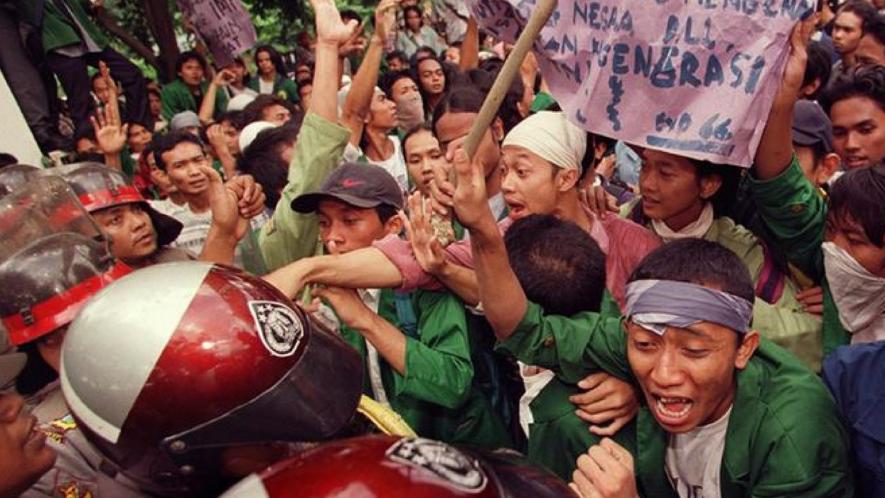Braving Repression, Thousands Take to the Streets in Indonesia Against Omnibus Law

Photo: Redfish/Facebook
On Monday, October 12, thousands of trade unionists, students and citizens held demonstrations and rallies in different parts of Indonesia against the ‘Omnibus Law’. A massive demonstration was held outside the presidential palace in Jakarta, organized by the Confederation of Indonesian Workers Welfare Union (KSBSI), a major trade union confederation. The demonstration outside the presidential palace is estimated to have had over 1,000 participants.
Representatives of the KSBSI stated that the demonstration was a part of the nationwide call by trade unions demanding withdrawal of the widely unpopular Job Creation Law, also called the Omnibus Law. A rally was also held at the Medan Square in the capital city, organized by KSBSI, with participants riding bikes with protest signs.
“Labor unions and workers will continue the protests in a structured manner according to the Constitution,” said the chairman of Indonesia Trade Union Confederation (KSPI), Said Iqbal, when speaking to Kompas. “We are antiviolence (sic) but don’t prohibit us from staging protests. We will continue to voice our opposition against the jobs law,” he added, responding to government allegations of violence by protesters.
KSPI, KSBSI, and Confederation of All Indonesian Workers’ Union (KSPSI), among others, have been organizing demonstrations for over a week, since the law was passed by the national legislature on October 5. Called the “omnibus law” for the broad range of laws it overturns, it was hastened through the People’s Representative Council (lower house of parliament) with very little deliberation.
The law overturns major labor protection laws, including a federal minimum wage, drastically reduces weekly holidays and paid leaves, cuts down severance pay, and also opens up several polluting and hazardous industries to private investment. The government claimed that it would create millions of jobs through the law, even as the country suffers a COVID-19 induced recession. The trade unions have challenged the claims.
Thousands arrested
While the government accuses protesters of violence, it is responding to the protests with immense repression. Indonesian police arrested thousands for participating in the nationwide protests. According to the police’s statements, 5,918 people were arrested as of Saturday, October 11, of whom 285 are facing criminal investigation for the supposed violence during the protests. Over the past week, the police crackdown on demonstrations is estimated to have caused different injuries to more than 200 protesters.
The massive scale of arrests and repression has continued over the weekend, with many civil society leaders, student activists and even journalists facing arrests and violence. The Coalition of Independent Journalists (CJI) stated last week that they had documented over 28 incidents of violence and intimidation against journalists by the police.
Of the 28 documented cases of intimidation, six were arrests made within the first two days of the protests and the rest were cases of destruction of “tools of coverage”, physical assault and even threats and intimidation by police personnel. The CJI stated that these actions were conducted in a bid to hamper coverage of protests and the police violence.
Academics respond to government circular
Students and youngsters have been at the forefront of the countrywide struggle against the law. Students’ unions across major universities have come out in support of the trade unions’ call to resist the law. Because of this, the government has recently attempted to target student participation.
On Saturday, the education ministry issued a circular asking students to not participate in the protests and even calling on educators and university authorities to dissuade students from participation. The circular also asked students to respond to the legislation in a “polite manner” and called on parents to ensure that students focus on their studies. It also dissuaded teachers from encouraging students from taking part in protests and agitations against the government.
The ministry’s circular was roundly criticized by academics across the country. The Association for Education and Teachers (P2G) leadership criticized the government circular, telling the ministry to not be “allergic” to criticisms. P2G coordinator Satriwan Salim also stated that the circular “is a form of intervention that robs campuses of their independence.” Salim also added that the ministry should appreciate students’ criticisms, arguing that it is “duty of intellectuals.”
In an open letter a group of university teachers, under the banner of the Alliance of Academics Rejecting the Omnibus Law, called the circular an attempt to silence scholars and students. Arguing that the obligations of the academia lies with truth and not to authorities, the group stated that “telling lecturers not to encourage their students to join rallies is a form of political intervention against the lecturers’ independence. Furthermore, telling students not to join rallies also disregards students’ independence in responding against injustices and abuse of power.”
Courtesy: Peoples Dispatch
Get the latest reports & analysis with people's perspective on Protests, movements & deep analytical videos, discussions of the current affairs in your Telegram app. Subscribe to NewsClick's Telegram channel & get Real-Time updates on stories, as they get published on our website.





















